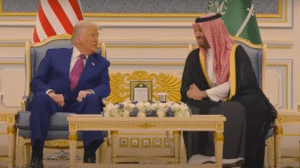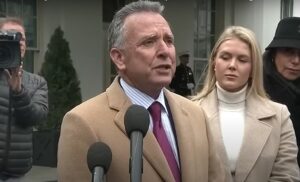The month of September was supposed to be the month of the final decision on the conflict between Israel and Lebanon over the maritime border between them.
Deciding between security escalation or reaching an agreement that would allow both countries to extract natural gas from the Mediterranean Sea.
However, Lebanese officials claim that Israel postponed the extraction of natural gas from the "Karish" field until October for fear of a military conflict with Hezbollah.
Into the picture of the conflict between Israel and Lebanon on the maritime border between them entered the Hezbollah organization, which is the real ruler in Lebanon thanks to its military power, it did it through a non-violent military move of launching 4 unarmed drones towards the "Karish" gas rig. In doing so, Hezbollah leader Hassan Nasrallah managed to change the agenda and put pressure on the Biden administration, European countries, Israel and the international companies involved in the production of natural gas.
Lebanese sources say that if an agreement is eventually signed between the two countries, Lebanon will be the main beneficiary because Hezbollah's strategy has helped it increase its bargaining power in the indirect negotiation through the American mediator Amos Hochstein.
The Lebanese newspaper Al-Akhbar, considered to be Hezbollah's mouthpiece, reported on August 24 that Israel is going to give up on the dispute over the maritime border and accept almost all of Lebanon's demands regarding natural gas because it fears the reaction of Hizbollah.
In fact, the Hizbollah organization established new rules of the game against Israel through the drones it launched at the "Karish" gas rig.
These rules can, on the one hand, be the light at the end of the tunnel that can get Lebanon out of its economic predicament or, on the other hand, in the event of a security escalation, drag Lebanon again into a military conflict with Israel, as happened in 2006 in the Second Lebanon War.
It seems that Israeli intelligence is unable to crack Hassan Nasrallah's true intentions and say whether this is successful psychological warfare and walking on the brink to achieve gains in negotiations or if he is really determined to go to a short military confrontation with Israel to achieve this goal.
In any case, the Israeli response to Hezbollah's threats indicates that Hassan Nasrallah succeeded in his strategy of strengthening deterrence against Israel while Israeli deterrence is eroding.
Hezbollah says that Hassan Nasrallah's new strategy has already taken Lebanon out of the American blockade that was imposed on Lebanon, a blockade that left Lebanon with two choices, to collapse economically or surrender to the American demands and indirectly to the demands of Israel.
Hezbollah has created a new rule of the game that Lebanon can use its military power to influence the negotiations and take by force its rights in everything related to its maritime border and natural gas treasures, which will significantly improve its collapsing economy and take it on a new path to a better future.
Also from an internal political point of view, Hezbollah's forceful move against Israel silenced the internal campaign of Hezbollah's opponents who blamed it for Lebanon's economic collapse, it is now portrayed as an national organization which can bring Lebanon important achievements in negotiations with Israel through American mediation.
Lebanese officials claim that Hezbollah's move forced the US and Israel to take seriously Lebanon's positions in the negotiations and put the negotiations within the framework of a short schedule of a few weeks that prevents Israel and the US from taking time and procrastinating.
The balance of power in the maritime border negotiations has now shifted in favor of Lebanon.
Hezbollah has set a date for the implementation of its military threat, the start of natural gas production from the "Karish rig" by Israel without an agreement being reached with Lebanon will result in its strong military response against all of Israel's gas rigs in the Middle East.
Last week, Hassan Nasrallah met in Beirut with the Secretary General of the Islamic Jihad, Ziyad Al-Nakhala, and the two discussed military coordination between them. Palestinian sources claim that, among other things, the possibility of the Islamic Jihad attacking the "Tamar" gas rig in front of the shores of Ashkelon from the Gaza Strip, with rockets or drones, was discussed.
During the military operation in the Gaza Strip in May 2021, Hamas tried to attack the "Tamar" gas rig using a drone but failed, as a result the Israeli Navy placed a ship near the rig with an "Iron Dome" battery on it.
It is still unclear how the negotiations between Israel and Lebanon on the maritime border will end and if It will be postponed until after the elections in Israel, Hezbollah insists that the decision will be made already in September and is threatening to launch military attacks to hasten the Lapid-Ganz government to accept the decision as soon as possible.
Israel looks very bad in the Middle East as having surrendered to Hezbollah because of the 4 drones it launched, the last Israeli military operation in the Gaza Strip against the Islamic Jihad is not enough to deter Hezbollah.
This is a dangerous precedent with regional consequences.
Israel did the right thing when it pre-emptively attacked the Islamic Jihad which planned to fire anti-tank missiles at the Israeli settlements near the border of the Gaza Strip, it should apply the principle of pre-emptively striking Hizbollah as soon as it has reliable intelligence about its intention to launch drones or rockets , so It can restore its deterrence. Israel must not negotiate under the threat of shooting at Israeli targets, it must neutralize Hizbullah's new strategy which is mafia-style and sticking a gun to its temple.
Hezbollah must not be allowed to establish new equations even at the cost of a short round of fighting of a few days between the IDF and Hezbollah, Israel must take the initiative as it did in the last round of fighting in the Gaza Strip against the Islamic Jihad.
Yoni Ben Menachem
Senior Middle East Analyst




